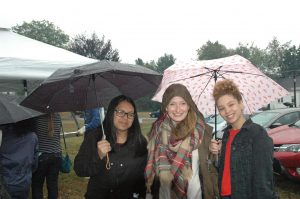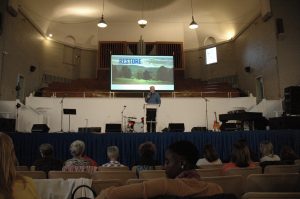A few Smithies, along with church leaders from all across New England, attended the Restore and Revive convocation, September 29 – October 2, which was the tail end event to a larger 10-day prayer conference.

Smithies and Mercy House Staff
Restore and Revive was held at the Moody Center in Northfield and honored the Legacy of D.L. Moody who helped to spark a wave of international missions known as the Student Volunteer Movement during the summer of 1886.
As part of the Saturday morning session, senior pastor of New Testament Church of Cedarville in Plymouth, Massachusetts Paul Jehle gave a talk entitled “Revival, Awakening and Reformation: A Vision for Our Time.”

Paul Jehle
Jehle focused his talk around the Parable of the Growing Seed in Mark 4: 26-29.
He also said, “This is what the kingdom of God is like. A man scatters seed on the ground. Night and day, whether he sleeps or gets up, the seed sprouts and grows, though he does not know how. All by itself the soil produces grain—first the stalk, then the head, then the full kernel in the head. As soon as the grain is ripe, he puts the sickle to it, because the harvest has come.”
Jehle compared revival to the planting of the seed and awakening to the crop being produced in the harvest. He urged the audience to take on a “Kingdom mindset,” because, Jehle explained, a plant grows to give itself to the harvest just as every stage of revival requires more cost of self.
Jehle also referenced the Northampton’s very own revivalist Jonathan Edwards, who preached just down the street from campus in 1729 during the Great Awakening. Edwards is widely known for his sermons published in Justification by Faith Alone, which references Romans 4:5, “however, to the one who does not work but trusts God who justifies the ungodly, their faith is credited as righteousness.” Edwards believed that the path to righteousness could not be walked by simply doing good deeds, but rather through faith in Christ Jesus.
Currently, First Churches at 129 Main St. is located in the remaining historical buildings that hosted Edwards’ many sermons, including “Sinners in the Hands of an Angry God,” for which Edwards received a great deal of criticism. Overall, though, Edwards had a profound impact on the Great Awakening and the Pioneer Valley, with records of around thirty people becoming Christians every week during the spring of 1734.
